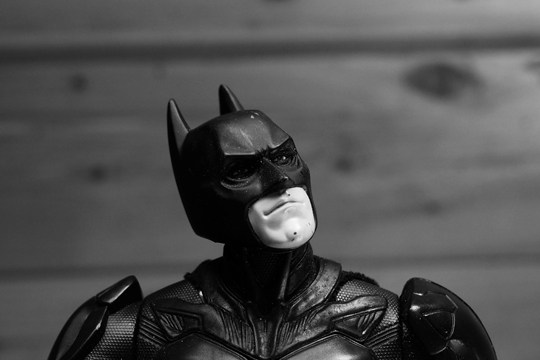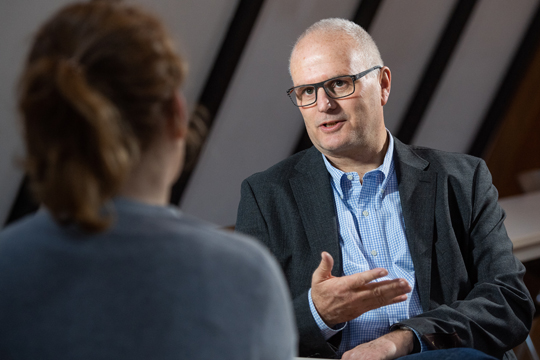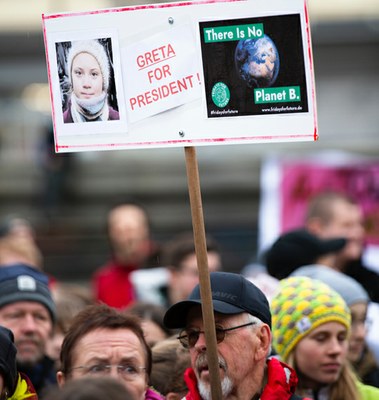Indicator of Society's Problems
Freiburg, Feb 21, 2020
Heroic tales have been around since ancient times. They feature classical warriors, exemplary workers, mighty politicians, and valiant women. But does today's society still need heroes, and if so, which ones? Prof. Dr. Ulrich Bröckling of the Institute of Sociology of the University of Freiburg pursues this question in his book "Postheroische Helden – Ein Zeitbild" ("Post-heroic Heroes – A Mirror of their Time"). In an interview with Annette Kollefrath-Persch, Bröckling makes it clear that each social order creates its own heroic figures.
 No radiant victor: In new films Batman appears as a broken hero who is plagued by self-doubt. Photo: Umanoide/Unsplash
No radiant victor: In new films Batman appears as a broken hero who is plagued by self-doubt. Photo: Umanoide/Unsplash
Mr. Bröckling, what makes a hero?
Ulrich Bröckling: Heroes are exceptional people who prove themselves in battle or conflict and are revered for it. But above all, their lives and deeds must be reported. There can be no heroic figures without heroic stories.
What sets these stories apart?
Classic heroic tales are mostly about a man, or much more rarely a woman, who set out to accomplish a mission, forestall impending doom, and make things turn out for the good. Heroic tales personalize. They put the spotlight on a larger-than-life figure – a savior who works alone. In order to tell the story in this way, the part others played must fade into the shadows. Heroic stories have a very long tradition. They've existed since ancient times, and not only in western culture. Even back then, people were already using these tales to make their own position in the world comprehensible.
Has the definition of a hero changed over the course of time?
Every era creates its own heroes. During ancient times, this was closely connected to ritual practices and mythical figures, such as the heroes Homer speaks of in the "Iliad." The model of Christ – who sacrificed himself – became the standard for a hero in medieval western culture. It wasn't until the French Revolution that common people could rise to the status of heroes, especially in the military. Farmers or trades people were by no means seen as suitable heroic figures before then. The rising middle class created its own heroic figures, which produced changes in literature as well. Finally, in the 19th and 20th Centuries, workers appeared as heroes – right up to including the heroic, exemplary workers who were honored in the early Soviet Union or China.
 "One person's hero is another's villain" is how Ulrich Bröckling emphasizes the polarizing effect heroic figures have on societies. Photo: Klaus Polkowski
"One person's hero is another's villain" is how Ulrich Bröckling emphasizes the polarizing effect heroic figures have on societies. Photo: Klaus Polkowski
Why do societies need heroes?
From a sociological perspective, heroes are indicators of problems and of what social orders demand of their members. By looking at how heroic tales are told and how someone becomes a hero, we can recognize what demands a society places on the individual and which sacrifices it requires. Heroic figures serve as an example that everyone else should emulate. Of course, there are also heroes who perform super-human tasks. People look up to them, but they are not a standard for others. They are revered, yet at the same time relieve their disciples' need to act, meaning "If the hero does it, then I don't have to do it."
You write about post-heroism. Given that, are there any heroes today?
Yes. But there are contradictory things going on simultaneously. On the one hand, there are more and more interpretations that we are living in a post-heroic time. This is being said, for example, of the western world with respect to how they wage wars. The theory is that people at best want to watch wars on television or at the movies, but they no longer want to subject themselves to it. The term "post-heroic warfare" doesn't mean, however, that more peaceful times are pervasive. Western countries and increasingly other nations as well, wage war with high-tech weapons, such as drones, for example, in an attempt to protect their troops.
And on the other hand?
On the other hand, heroic stories are booming. Hollywood is producing one hero blockbuster after another. And in politics, the so-called strong men have come to the fore, figures like Donald Trump, Vladimir Putin, Recep Tayyip Erdoğan, or Jair Bolsonaro, who like to present themselves as macho folk heroes. By contrast, we find contemporary heroic figures in social protest movements. Women like Greta Thunberg or Carola Rackete. This contemporaneity of post-heroic orientations and the emergence of new heroes is what interest me as a sociologist.

Activists such as Greta Thunberg of Sweden are an example of more recent heroes. The battle against environmental destruction is the central facet of the reverence shown them by society. Photo: Markus Spiske/Unsplash
What are the characteristics of post-heroic heroes?
There is an intensified heroism in terms of civil courage and resistance against environmental destruction or sealing borders. "Post-heroic" does not mean the time after the heroic. It signifies that traditional images of heroes are perceived as problematic. We can find examples of this in popular culture. Christopher Nolan's "Batman Trilogy" shows a broken hero who indeed still has super-human powers, but at the same time he is buffeted by self-doubt and psychological conflicts. He is anything but a radiant victor. Examples of heroic models in civic life who are not associated with violence are gaining significance. Rescuers, like the pilot Chesley Sullenberger, who safely landed an airliner on the Hudson River. And sporting heroes, of course. Those are proving grounds for heroes who are morally unquestionable and are therefore more compatible with post-heroic ideals.
And that's caused a change in heroic stories?
Classical heroic tales that are focused on one person no longer function in modern societies. Few people unreservedly believe today that great men are the ones who make history. The world is too complicated to solve its problems with a single stroke. Many actors are required. But the fact that most tend to feel themselves more or less powerless produces a continuous hunger for heroes. We can't stand inflated heroic figures any longer, yet we can't rid ourselves of them either.
Is there still social consensus about who is a hero?
Heroes polarize people. One person's hero is another's villain. Some revere Trump, others Thunberg. The entire panoply of this year's World Economic Forum in Davos unfolded in such a way that these two people, who could not be more opposite, would meet. Polarization of the society is reflected in how paradoxical its heroes are. Anyway, the fact that there is argument about heroes and legitimizing them and that they aren't simply imposed is a strength of democratic societies.
Collaborative Research Centre (SFB) "Heroes. Heroizations. Heroisms."

